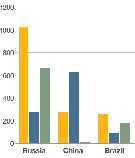A global network of groups tied to the asbestos industry has spent $100 million since the mid-1980s to continue to produce and sell the mineral — a known carcinogen used in insulation and construction — in the developing world, according to a new report. The BBC and the International Consortium of Investigative Journalists say that despite bans or restrictions on asbestos in 52 countries, asbestos companies continue to supply roughly 2 million metric tons of asbestos a year to rapidly developing countries such as India, China, Brazil, and Mexico. The companies and related trade groups, led by the Canadian government-backed Chrysotile Institute, have engaged in sophisticated lobbying and public relations campaigns claiming that the white asbestos — chrysotile — now in use is safer than blue and brown forms of the mineral, which have caused cancer and lung disease in hundreds of thousands of people. As a result of the past and present use of asbestos, the report said roughly 100,000 workers will die of asbestos-related diseases annually and that 5 to 10 million people could die from asbestos exposure by 2030.
Companies Market Asbestos In Developing World, News Reports Say
More From E360
-
OPINION
Trump’s Logging Push Thrusts a Dagger at the Heart of Wilderness
-
INTERVIEW
Pakistan’s Solar Revolution Is Bringing Power to the People
-
Food & Agriculture
In Uganda, Deadly Landslides Force an Agricultural Reckoning
-
Energy
Why U.S. Geothermal May Advance, Despite Political Headwinds
-
Food & Agriculture
In War Zones, a Race to Save Key Seeds Needed to Feed the World
-
Climate
Lightning Strikes the Arctic: What Will It Mean for the Far North?
-
RIVERS
A Win for Farmers and Tribes Brings New Hope to the Klamath
-
Solutions
Deconstructing Buildings: The Quest for New Life for Old Wood
-
NATURAL DEFENSES
How Restored Wetlands Can Protect Europe from Russian Invasion
-
Solutions
Birds vs. Wind Turbines: New Research Aims to Prevent Deaths
-
Biodiversity
Cambodian Forest Defenders at Risk for Exposing Illegal Logging
-
OPINION
The ‘Green’ Aviation Fuel That Would Increase Carbon Emissions
